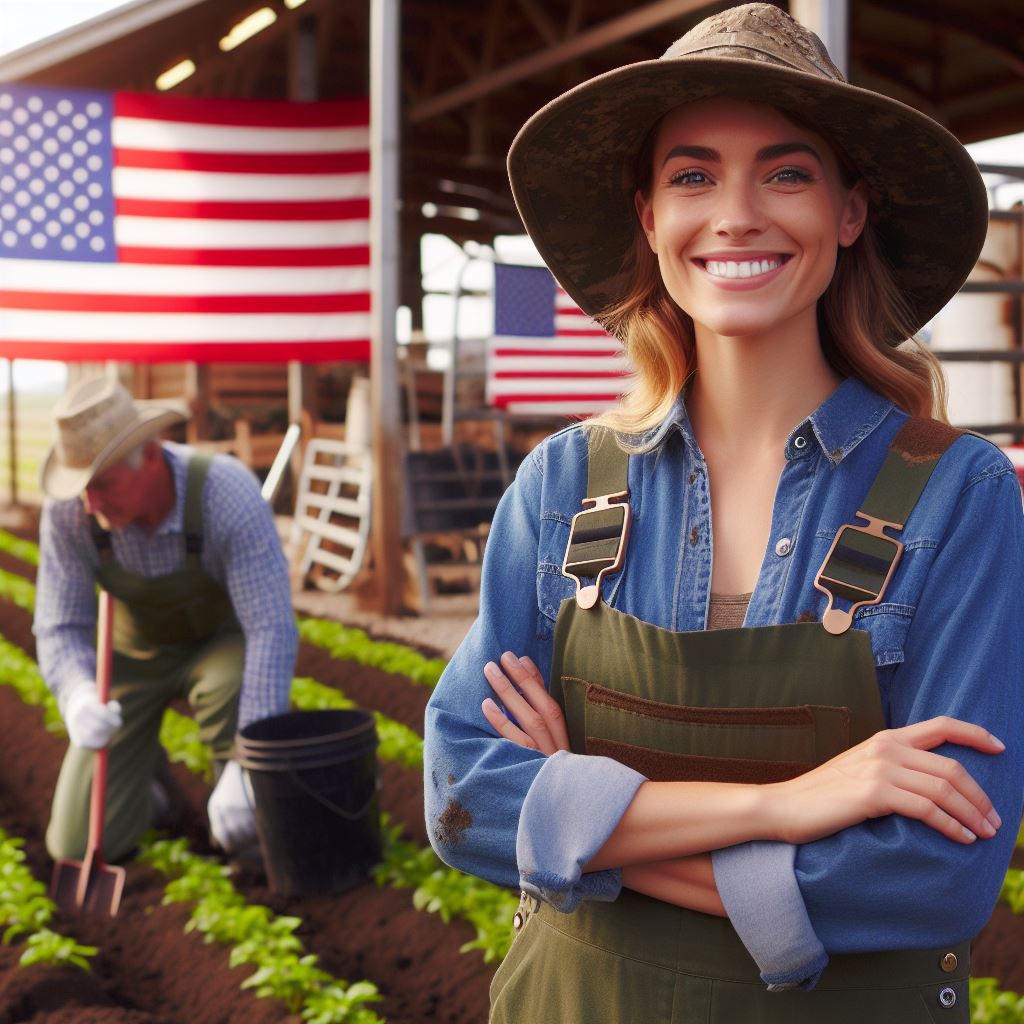Introduction
Embarking on unconventional farm starts, lawyers are trading courtrooms for pastures, redefining career paths.
This shift reflects a growing interest in alternative farming methods, emphasizing sustainability and ethical practices.
Today, we’ll explore the intriguing journey of lawyers-turned-livestock farmers, uncovering the motivations, challenges, and successes along their unconventional paths.
As society increasingly prioritizes organic and locally sourced produce, the role of lawyers in agriculture signifies a broader trend towards more diversified and environmentally conscious farming practices.
Through their unique experiences, these individuals challenge conventional notions of career trajectories and demonstrate the potential for unexpected career shifts in pursuit of a more meaningful and sustainable way of life.
Join us as we delve into the stories of these legal professionals who have found fulfillment and purpose in the fields of livestock farming, inspiring others to consider alternative paths to agricultural entrepreneurship.
Overview of the lawyer to livestock farming trend
The world of farming is not typically associated with lawyers, but a growing trend is emerging where attorneys are pursuing farming as a second career.
This shift is indicative of a desire for a more sustainable lifestyle and a reconnection with nature.
In recent years, there has been a significant increase in the number of lawyers who have left their legal careers behind to become farmers.
Many of them cite a dissatisfaction with the high-stress, fast-paced nature of the legal profession as a driving force behind their decision.
These lawyers-turned-farmers are seeking a change of pace and a greater sense of fulfillment.
Farming allows them to reconnect with the land, work with their hands, and find solace in the simplicity of life on the farm.
The reasons behind this trend are multifaceted.
Firstly, lawyers are increasingly drawn to the idea of a more sustainable lifestyle.
They are passionate about environmental issues and see farming as a way to contribute positively to the earth.
By growing their own food and adopting organic farming practices, these lawyer-farmers see themselves as active participants in the fight against climate change.
Secondly, farming provides an opportunity for these individuals to reconnect with nature.
Many lawyers spend their days in an office, surrounded by paperwork, and disconnected from the natural world.
By becoming farmers, they can escape the confines of their legal careers and immerse themselves in the beauty and rhythm of the natural world.
Statistics or anecdotal evidence to support the claims
Statistics support the growing trend of lawyers turning to farming.
According to a survey conducted by the American Bar Association, approximately 10% of lawyers have considered a career change to farming.
This figure is significant considering the traditional association of lawyers with the legal profession.
Anecdotal evidence also suggests that this trend is on the rise.
Numerous success stories of lawyers-turned-farmers have emerged, showcasing the potential for a fulfilling and prosperous second career in agriculture.
These stories inspire and motivate others to make the leap from the courtroom to the countryside.
One such success story is that of John Stevens, who left behind his lucrative law practice to start a sustainable livestock farm.
He now raises grass-fed cattle and sells organic meat to local restaurants.
Stevens claims that farming has brought him a sense of purpose and fulfillment that he never experienced as a lawyer.
Another lawyer-farmer, Sarah Johnson, traded her legal briefs for overalls and now operates a thriving organic vegetable farm.
She believes that her legal background has equipped her with the necessary skills to navigate the complexities of running a small business.
In fact, the phenomenon of lawyers transitioning to livestock farming signifies a growing trend towards a more sustainable lifestyle and a reconnection with nature.
Whether motivated by a desire for a slower pace, a passion for sustainability, or a need for personal fulfillment, these lawyer-farmers are finding a new sense of purpose on the land.
The statistics and success stories serve as compelling evidence of this trend, showcasing the potential for a successful and fulfilling second career in agriculture.
Read: Harvest Tales: Life in the Wheat Fields
Challenges and Considerations of Transitioning from Law to Livestock Farming
Transitioning from a career in law to livestock farming can present numerous challenges and considerations.
Lawyers who decide to embark on this unconventional journey must be prepared for the obstacles that lie ahead.
The Main Obstacles Lawyers May Face when Starting a Farm
Lawyers transitioning to livestock farming may encounter various obstacles.
One prominent challenge is the lack of experience and knowledge in agricultural practices.
While expertise in law may provide valuable skills in certain aspects of farming, such as contract negotiation or regulatory compliance, it does not necessarily translate to hands-on farming skills.
The Need for Acquiring New Skills and Knowledge in Farming Practices
Lawyers turned farmers must recognize the importance of learning new skills and acquiring knowledge specific to farming practices.
This may involve attending workshops, courses, or even working alongside experienced farmers to gain hands-on experience.
Understanding animal husbandry, crop management, and farm equipment operation are essential for success in livestock farming.
Transform Your Agribusiness
Unlock your farm's potential with expert advice tailored to your needs. Get actionable steps that drive real results.
Get StartedThe Financial Implications and Risks Involved in Changing Careers
Transitioning from law to livestock farming also raises financial implications and risks.
Starting a farm requires significant upfront investment, including purchasing land, livestock, equipment, and infrastructure.
Lawyers must assess their financial resources and develop a detailed budget to ensure they can sustain themselves during the initial years when farms often operate at a loss.
Additionally, there may be loan obligations, insurance costs, and the uncertainty of market fluctuations that lawyers-turned-farmers need to consider.
The Importance of Planning and Preparation to Achieve Success
Planning and preparation are vital for lawyers who aspire to succeed as livestock farmers.
Proper planning involves conducting market research, identifying target customers, clarifying farming objectives, and developing a comprehensive business plan.
Lawyers should also consider seeking advice from experienced farmers or agricultural consultants to gain insights into potential challenges and strategies for success.
In short, transitioning from a career in law to livestock farming is accompanied by several challenges and considerations.
Lawyers must recognize and address these obstacles by acquiring new farming skills, thoroughly evaluating the financial implications, and carefully planning their farming venture.
While the journey may be daunting, with the right mindset, determination, and preparation, lawyers can successfully navigate this transition and find fulfillment in their unconventional farm start.
Read: Grape Expectations: A Vintner Journey

Success stories of lawyers turned farmers
Transitioning from a career in law to livestock farming may seem like an unconventional path, but there are several inspiring examples of lawyers who have successfully made this transition.
These individuals have embarked on unique journeys, overcoming challenges and implementing specific strategies that contributed to their success.
Let’s take a closer look:
John Thompson – From the courtroom to the pasture
John Thompson, a former corporate lawyer, discovered his passion for farming after inheriting a small ranch.
Determined to make a career out of it, he joined farming communities and attended workshops to gain the necessary knowledge.
Despite initial challenges, Thompson persevered and implemented innovative livestock management techniques, increasing his farm’s productivity.
His legal background also helped him navigate regulatory and administrative processes easily.
Sara Collins – From the law library to the dairy farm
Sara Collins, a successful intellectual property lawyer, decided to leave her high-stress job to pursue a more fulfilling life.
She chose to start a dairy farm, a venture that seemed worlds apart from her legal background.
Collins faced financial hurdles, but she approached her career change strategically.
She sought mentorship from experienced farmers, enrolled in agricultural programs, and focused on sustainable farming practices.
Today, her dairy farm is thriving, providing high-quality products to local communities.
Michael Bennett – Bridging the gap between law and sustainable agriculture
Michael Bennett, a prominent attorney specializing in environmental law, saw an opportunity to combine his legal expertise with his passion for sustainable agriculture.
He realized that many farmers struggled with compliance issues related to environmental regulations.
Bennett established a consultancy firm that helps farmers navigate the complex legal landscape while adopting sustainable farming practices.
His unique approach and legal knowledge have made him a trusted advisor in the farming community.
Emily Turner – Advocating for animal rights through farming
Emily Turner, a seasoned criminal defense lawyer, decided to channel her passion for animal rights into her farming career.
She started a small-scale livestock farm and focused on providing ethical and humane treatment to her animals.
Turner actively supports animal welfare legislation and educates fellow farmers on responsible farming practices.
Her legal background proved invaluable when advocating for the rights and wellbeing of animals in the farming industry.
These success stories highlight the benefits that lawyers-turned-farmers gained from their career change:
- Improved work-life balance: Lawyers often face long hours and high levels of stress. Farming allowed these individuals to lead a more balanced and fulfilling lifestyle.
- Connection with nature: Working with animals and tending to the land provided a deep sense of connection with nature, something that many lawyers were longing for.
- Fulfilling a passion: For these individuals, leaving behind the legal profession meant pursuing their true passion and experiencing a greater sense of purpose.
- Contributing to the local community: Through their farming ventures, these lawyers-turned-farmers were able to provide local communities with sustainable and ethical food options.
- Personal growth: Transitioning to a completely different career allowed these individuals to develop new skills, gain knowledge about agriculture, and grow as individuals.
In essence, the journey from lawyer to livestock farmer may seem unconventional, but it can lead to incredible success and personal fulfillment.
These individuals overcame challenges, implemented effective strategies, and reaped the benefits of this career change.
Their stories serve as inspiration for aspiring lawyers who dream of a life connected to the land and animals.
Read: Dawn to Dusk: A Dairy Farmer Story
Resources and support available for lawyers interested in livestock farming
Are you a lawyer interested in making a career switch to livestock farming?
Fortunately, there are numerous organizations, networks, and platforms dedicated to helping professionals like you enter the farming industry.
Additionally, there are educational programs, courses, and workshops specifically designed for career switchers like yourself.
If you’re looking for guidance and support during the transition, mentorship opportunities or partnerships may also be available.
Relevant organizations, networks, and platforms
- Farm Law Network: This network connects lawyers with a passion for agriculture and provides resources on legal aspects of farming.
- American Farmland Trust: A nonprofit organization that offers support and resources for farmers, including legal assistance.
- National Sustainable Agriculture Coalition: This coalition advocates for policies and programs that support sustainable agriculture and provides resources and networking opportunities for farmers.
- Local Farming Associations: Many regions have local farming associations that offer support and networking opportunities for aspiring farmers.
Educational programs, courses, and workshops
- Agricultural Extension Programs: These programs, often offered by universities and agricultural institutions, provide education and training for individuals interested in agriculture.
- Online Courses: There are various online platforms that offer courses specifically designed for career switchers in the agricultural industry.
- Agricultural Workshops: Look for workshops that cover topics such as livestock management, sustainable farming practices, and agricultural law.
- Farming Apprenticeships: Consider joining a farming apprenticeship program, where you can gain hands-on experience and learn from experienced farmers.
Mentorship opportunities and partnerships
Transitioning from law to livestock farming can be daunting, but mentorship opportunities and partnerships can provide invaluable guidance and support.
- Local Farmer Mentors: Reach out to local farmers who have successfully made the transition from law to farming and ask if they are willing to mentor you.
- Lawyer-Farmer Partnerships: Form partnerships or collaborate with farmers who could benefit from your legal expertise in exchange for farming knowledge and experience.
- Agricultural Support Organizations: Some organizations offer mentorship programs that connect aspiring farmers with experienced mentors in the industry.
- Farm Incubator Programs: These programs provide aspiring farmers with access to land, resources, and mentorship as they start their farming journey.
Remember, embarking on a new career path requires dedication, learning, and a supportive network.
Explore the resources, educational programs, and mentorship opportunities available to lawyers interested in livestock farming.
With the right support, you can successfully transition from the courtroom to the farm, embracing a fulfilling and rewarding new chapter in your professional life.
Read: Hops and Dreams: The Craft Beer Farmer
Conclusion
In this blog post, we explored the unconventional farm starts of lawyers turning to livestock farming.
We discussed how lawyers are finding fulfillment and success in this career change.
The growing popularity of this trend is evident, as more and more lawyers are venturing into the world of farming.
For those readers who are interested in making a similar career change, we encourage you to explore the possibilities and resources available to you.
Livestock farming can be a rewarding and fulfilling profession, providing a deeper connection to nature and a sense of purpose.
Don’t be afraid to take that leap of faith and pursue your passion for farming.
By combining your legal knowledge and skills with a new agricultural venture, you can create a thriving business that offers both financial stability and personal fulfillment.
The support and guidance of farming organizations, industry experts, and fellow lawyers-turned-farmers can provide invaluable assistance on this exciting journey.
So, whether you dream of raising cattle, growing crops, or tending to goats, remember that there are resources available to help you make your career change a reality.
Embrace the growing trend of lawyers turning to livestock farming and discover a whole new world of possibilities.
Take the first step and immerse yourself in the world of livestock farming.
Embrace the challenges and rewards that come with this unconventional farm start.
Let your passion for agriculture and love for animals guide you on a remarkable journey of self-discovery and fulfillment.




